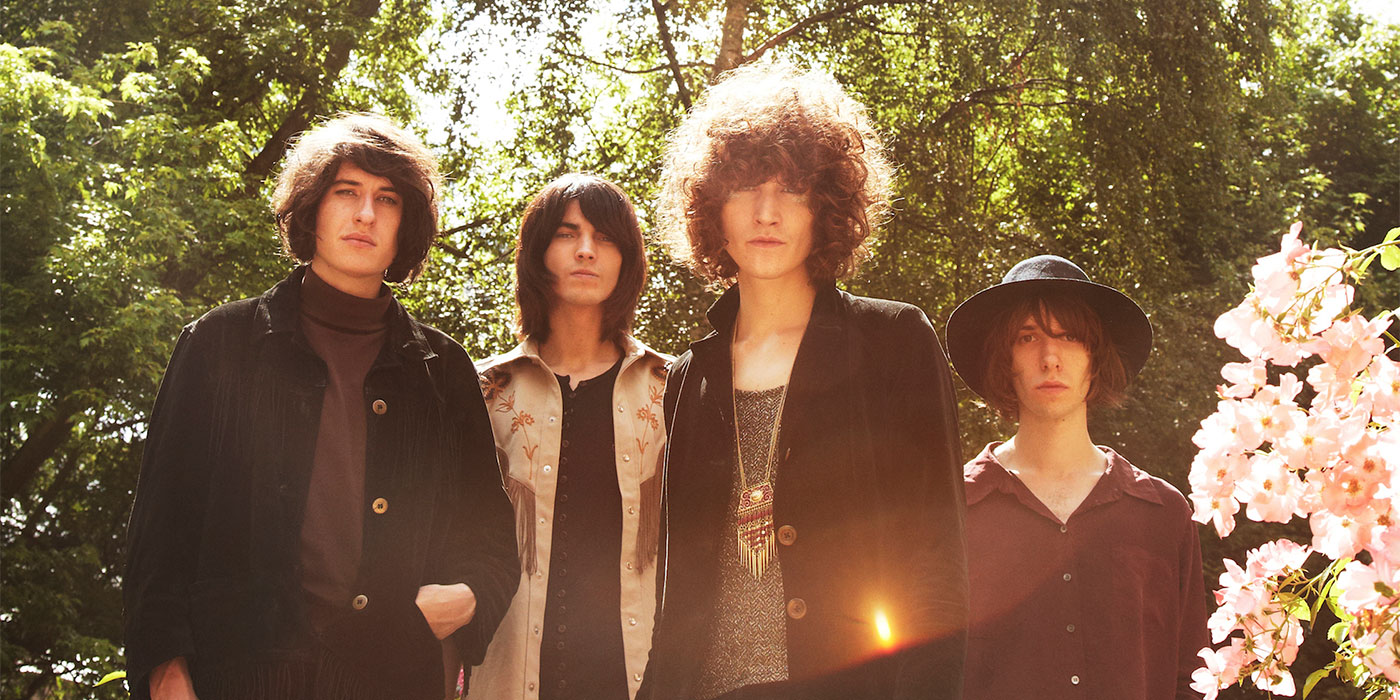Temples began in Kettering, England (where Weetabix is made) when James Bagshaw and Thomas Warmsley began recording demos in their home studio. They posted the music on YouTube and attracted the attention of Jeff Barrett from Heavenly Recordings. Vocalist/guitarist James Bagshaw spoke with Jonk Music about the band’s beginnings, their influences, and what goes into their songwriting.
What was it like when Jeff Barrett reached out to you?
“It was amazing. We didn’t really expect that. We were aware of what Heavenly Recordings had done in the past and what they’re doing currently. I don’t think anyone expects to get the phone call. You expect to be the one doing the calling, trying to sell your music. That’s the classic thing that bands do, send their demos through and rarely hearing anything back. We didn’t send any demos out. We just happened to have a phone call.”
Did you do the deal over the phone?
“We met up for a drink, he came to a couple of shows, and it was just a handshake, really, for the single. After that, we talked about doing the album. We had an extensive conversation to make sure that we were on the same page, which we knew we were. We wanted to make sure we had creative control over everything since it was the way we were used to working.”
Have you spent much time with your label mates? (Toy, Stealing Sheep, Charlie Boyer and The Voyeurs)
“We’ve done a few shows together, kind of like a Heavenly road trip to Paris, which was really good. Most of the bands all together on a coach. It was like a school trip but with alcohol.”
How does touring America compare to touring the UK?
“It’s different. When we’re touring Europe, everywhere is slightly different. In America, it’s the first time that we’ve had a proper tour bus, where we’ve got beds. That’s all new and that’s quite nice. It’s nice having that home on wheels, instead of hotels. It’s quite nice. I’m sure we’ll be sick of it by the end of the tour and want to have a proper bed.”
Some bands want to create a sound in the studio and then just re-create the same thing live. Is that how you operate?
“We always want to approach live shows differently. We want to maintain the atmosphere around the songs that we’ve recorded. On certain songs, you don’t want to jam out because it would take the impact away from a short section that’s only meant to be a little interlude. Other songs are a bit more free. Songs like ‘Mesmerise’ we extend live and really take it up a notch. ‘Sand Dance’ as well. Sometimes you can’t get the exact sound that you want live, so you might orchestrate the songs differently. You take over a certain melodic part on a different instrument, or put it through a different pedal, just to create a different vibe from the way they come across on records.”
Are touring and creating new music separate for you? Do you ever get to create new music on tour?
“We haven’t had a chance to write anything yet. We get a chance to play around in soundcheck, but you never really have enough time in soundcheck to do anything new. You just try to make sure the sound is good so that you can have a good gig. We have some ideas floating around but nothing recorded. We’re just enjoying playing these songs, focusing on bringing them to life.”
You’ve talked about producers that you admire like Jack Nitzsche (Phil Spector, Rolling Stones, Neil Young) and Tony Visconti (David Bowie). What is it about their work that really draws you in?
“Just their names, you know straight away when a song has been produced by them. I think that’s a credit to a producer if they have their own sound. You’ve got that with Jack Nitzsche, Tony Visconti, Joe Meek, and Phil Spector. They have a strong statement from their way of recording. That appeals, in itself, that you can instantly tell. A lot of bands, you can listen to the song and you wouldn’t know who produced it, and it doesn’t really stand out. But when you learn those traits, you learn to love it, and you love the song even more because it’s portrayed in a more alien way and it’s not just standard.”
You guys get lumped in with other modern psychedelic bands. Were there psychedelic bands from the ’60s and ’70s that inspired you to write music?
“It wasn’t certain bands that made us want to write music. We were trying to write music that wasn’t within any type of genre constraints. I guess you write with your influences subconsciously — like, early Pink Floyd, David Bowie, King Crimson. There’s not just one artist. We never really wanted to sound like any of them because we wanted to do our own thing. You can’t help that your influences come out through your music. The Verve have been really important to us as well, and the whole twelve-string thing.”
What appeals to you about the twelve-string guitar as opposed to a six-string?
“They’re different instruments in many ways. Having an octave or a unison string for each string, you get a harmonic phasing of the strings which gives you a very big sound for one guitar. It’s very much like having two six-string players but with one with a capo on the twelfth fret. It’s quite a full sound. If ‘Shelter Song’ was on a six-string guitar, with the same riff, it wouldn’t have near the impact it has on a twelve-string.”

